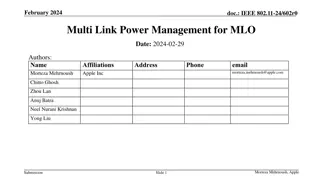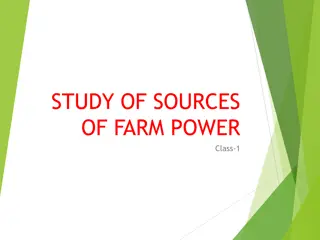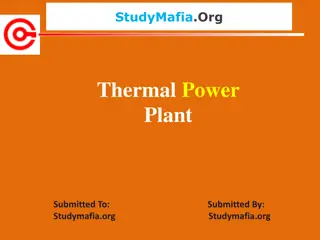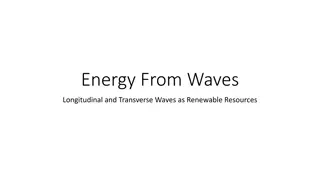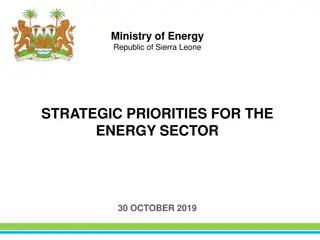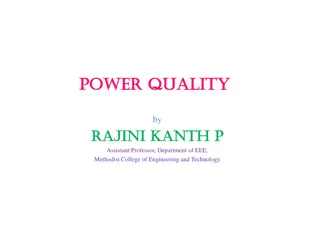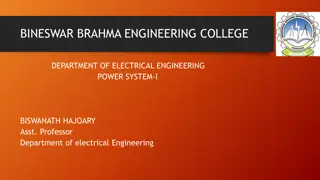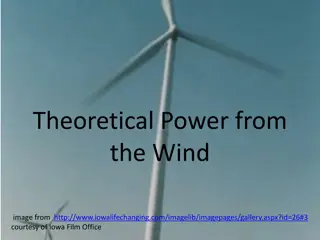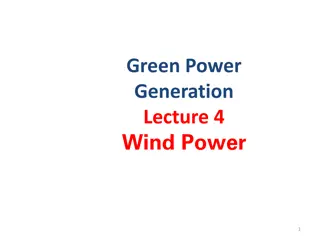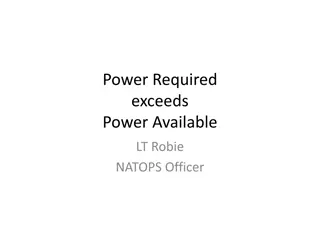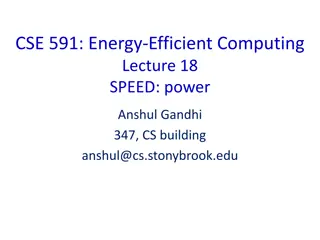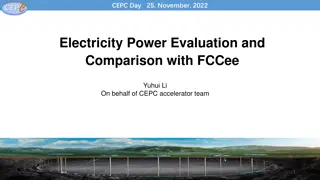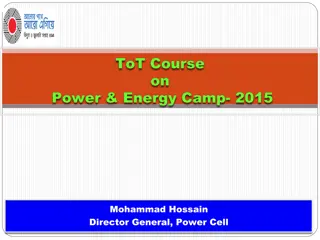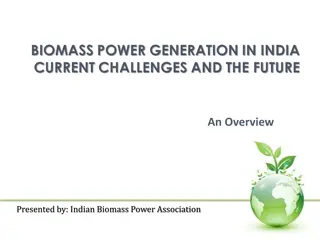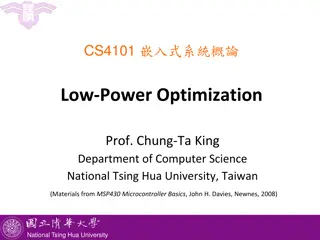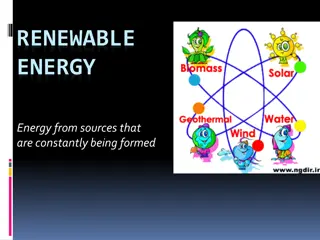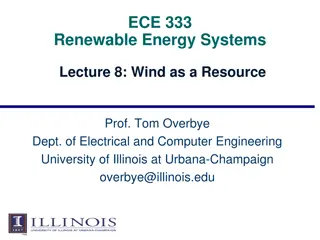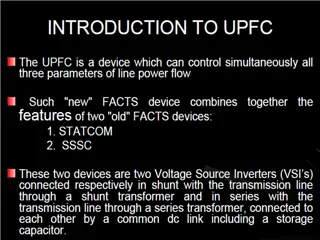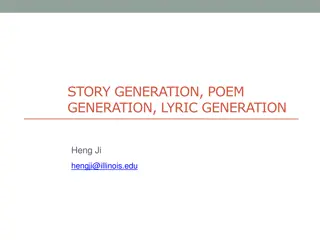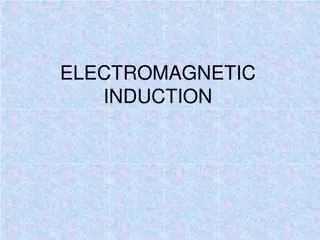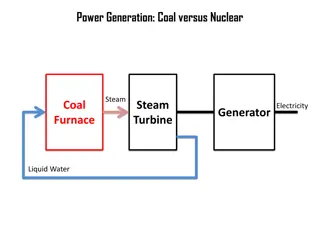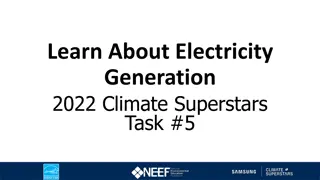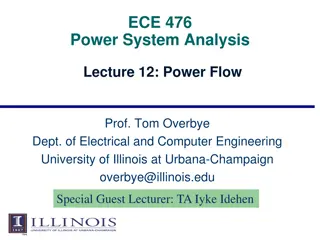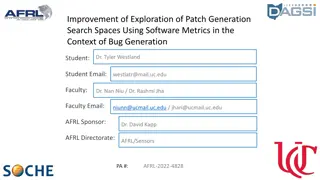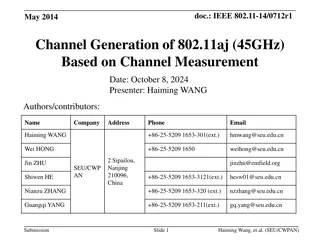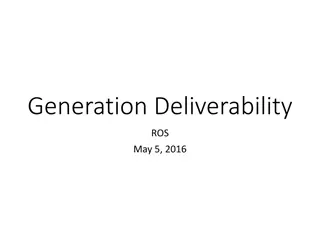Safety Practices for Effective O&M at Ib Thermal Power Station, Odisha
Explore the best safety practices recommended by experts at Odisha Power Generation Corporation's Ib Thermal Power Station for effective operation and maintenance. Learn about the importance of safety in high-risk maintenance activities and the significance of drills and protocols. Discover insights
1 views • 30 slides
Cisco Systems Fault Managed Power Portfolio Overview
Cisco Systems offers an industry-leading Fault Managed Power (FMP) patent portfolio comprising 24 active assets across seven INPADOC families. The portfolio includes patents supporting fault-managed power systems, PoE deployments, DC power distribution, DC-DC conversion, and HVDC connectors. The FMP
4 views • 4 slides
Improving Multi-Link Power Management Efficiency in IEEE 802.11 Networks
The document discusses challenges with per-link power mode changes in multi-link scenarios in IEEE 802.11 networks, proposing a solution for more efficient power management. It addresses issues such as latency and inefficiencies in signaling for power mode changes, introducing scheduled multi-link p
6 views • 9 slides
Understanding Power Transfer and Impedance Matching in Circuits
Exploring the concept of maximizing power transfer between a source and load through impedance matching. Learn about complex conjugates, real and magnitude of complex numbers, average power in circuits, and the importance of minimizing reflected power. Discover how incident, reflected, and delivered
3 views • 33 slides
Overview of Farm Power Sources and Utilization in Agriculture
Farm power sources in agriculture include human, animal, mechanical, and renewable energy. Human power is costly but versatile, while animal power is traditional and provides manure. Mechanical power from tractors and engines is efficient. India's farm power sources reflect a mix of traditional and
0 views • 12 slides
Understanding Thermal Power Plants: Overview and Operation
Thermal power plants play a crucial role in converting heat energy into electricity for various applications. This article covers the definition, layout, working principle, and components of thermal power plants, highlighting their advantages and top features. From converting heat into mechanical po
0 views • 20 slides
Enhancing Information Retrieval with Augmented Generation Models
Augmented generation models, such as REALM and RAG, integrate retrieval and generation tasks to improve information retrieval processes. These models leverage background knowledge and language models to enhance recall and candidate generation. REALM focuses on concatenation and retrieval operations,
1 views • 9 slides
Comparison of 2nd vs 3rd Generation Fire Suppression Systems
The comparison highlights the evolution from 1st generation dry chemical agents to advanced 3rd generation systems like the Piranha Hybrid System, ensuring better fire protection in restaurants. It discusses the drawbacks of 2nd generation systems, emphasizing the need for improved fire suppression
1 views • 20 slides
Harnessing Wave Energy: A Renewable Resource for Sustainable Power Generation
Utilizing the kinetic energy of ocean waves through transverse and longitudinal wave interactions, wave energy presents a promising renewable resource for electricity generation. This form of renewable energy, akin to wind power, involves converting the motion of waves into electrical power by deplo
0 views • 16 slides
Strategic Priorities for Sustainable Electricity Generation in Sierra Leone
The Ministry of Energy in Sierra Leone has outlined strategic priorities to ensure sustainable electricity generation and supply in the short, medium, and long term. Key actions include implementing an integrated electricity plan, identifying externally funded projects for power supply, and addressi
0 views • 19 slides
Understanding Power Quality and Its Impact on Electrical Systems
Power quality refers to the characteristics of electrical power that drives sensitive equipment. It involves voltage and current deviations from ideal waveforms, impacting the efficiency and reliability of electrical systems. Various types of power quality phenomena exist, such as voltage variations
1 views • 16 slides
Overview of Electric Power Plants
Explore the functioning of various electric power plants including nuclear, fossil fuel thermal, hydroelectric, wind, solar, geothermal, biomass, and ocean power plants. Understand the processes involved in generating electricity from different energy sources such as fission, combustion, steam gener
0 views • 15 slides
Overview of Power Systems and Energy Generation
The power system encompasses generation, distribution, and transmission systems that convert various forms of energy, such as coal and diesel, into electrical energy. Energy cannot be created or destroyed but can only be transformed from one form to another. Generation involves converting primary en
3 views • 30 slides
State of Power Decarbonization and Resource Planning in Q1 2023
In Q1 2023, there was no recent action on power decarbonization and resource planning by 47 states plus DC & PR. The activity ranged from no action to 10 or more actions in terms of power decarbonization and resource planning. The greatest contributing resources to the state generation mix in 2022 w
0 views • 16 slides
Understanding Wind Power Generation Principles
Exploring the fundamental concepts of wind power generation, this content discusses the relationship between kinetic energy, air mass, and wind energy. It delves into the calculation of wind power using air density, velocity, and swept area, providing insights into how wind power efficiency varies w
0 views • 10 slides
Understanding Wind Power Generation and Wind Farms
Wind power generation involves the use of wind turbines to produce electric power, often in the form of wind farms consisting of multiple turbines. Factors such as wind speed, turbine siting, and altitude play crucial roles in maximizing power production. Wind farms can be located onshore or offshor
1 views • 60 slides
Comprehensive Overview of Sewage Treatment Plant Processes and Energy Generation
This seminar presentation dives deep into the world of sewage treatment plants, covering definitions, introduction, STP treatment stages (including primary, secondary, and tertiary treatments), energy generation through microbial fuel cells, and biogas generation. It emphasizes the importance of tre
0 views • 15 slides
Exploration of Difference Frequency Generation (DFG) for Laser Beam Generation
Examining the process of Difference Frequency Generation (DFG) for creating laser beams, establishing signal and idler wavelengths, and optimizing power output. The study delves into conservation of energy and momentum principles, showcasing experimental results and proposing future improvements for
0 views • 8 slides
Development of Attosecond Theory for Nobel Prize through Verilog Programming
Attosecond generation is a crucial technique for creating attosecond pulses by manipulating radiation waves. This research paper focuses on developing the Attosecond generation equation through Verilog programming and validating it using test programming techniques. The interface between equations,
0 views • 15 slides
McGill First Generation Orientation Event
The McGill First Generation Orientation event, organized by Campus Life & Engagement, took place on August 31st, 2021. The event highlighted the importance of supporting first-generation students and fostering allyship with Indigenous communities. It featured various sessions including introductions
0 views • 20 slides
Helicopter Power Management Guidelines
Understanding the factors that can lead to power required exceeding power available in a helicopter is crucial for safe operation. Indications such as uncommanded descent, rotor droop, loss of tail rotor authority, and right yaw signal potential issues to watch out for. Knowing when such occurrences
0 views • 11 slides
Exploring Power Efficiency in Computing Systems
In this lecture series on energy-efficient computing, various concepts related to dynamic frequency scaling, power capping, power shifting, power modeling, and power measurement are discussed. The impact of power on server speed is explored, alongside strategies for improving performance within powe
0 views • 17 slides
Comparison of Electricity Power Systems Between CEPC and FCCee
The evaluation and comparison of electricity power systems between the CEPC and FCCee accelerators reveal the power breakdowns, RF power consumption, magnet power supply, and overall power usage. Differences in power consumption for various components such as RF, magnets, and vacuum systems are high
0 views • 19 slides
Wholesale Storage Load Metering of Losses in Distributed Generation Battery Facility
Example system configuration in ERCOT involving a wholesale storage load metering system to track losses in a distributed interconnected generation battery facility. The system includes electrical storage systems, generation resources, and distribution generation components. Challenges arise in dete
0 views • 8 slides
Overview of Power Sector Growth and Expansion in Recent Years
In the last six years, the power sector has shown significant growth in terms of generation capacity, access to electricity, and reduction in system losses. The generation capacity has increased, transmission and distribution lines have expanded, and there has been a notable rise in per capita gener
0 views • 18 slides
Overview of Indian Biomass Power Association
Indian Biomass Power Association presents an overview of the Indian power scenario, showcasing the growth of renewable energy generation, the challenges faced by the power sector, the need for renewable energy to reduce carbon dioxide emissions, and the comparison of biomass and wind power potential
0 views • 16 slides
Low-Power Optimization in MSP430 Microcontroller at National Tsing Hua University
This material discusses the significance of low-power optimization in modern devices, focusing on the MSP430 microcontroller features for energy efficiency. It covers topics such as energy conservation, power generation, and strategies for reducing power consumption at the device, circuit, and syste
0 views • 23 slides
Exploring Renewable Energy Sources
Renewable energy is derived from constantly replenished sources such as solar power, wind power, biomass, hydroelectricity, and geothermal energy. These sustainable sources offer clean alternatives to traditional fossil fuels, contributing to a greener future. Solar energy utilizes the sun's power t
0 views • 16 slides
Understanding Wind Power Generation: Key Concepts and Calculations
Exploring wind power generation concepts, this content delves into the physics behind harnessing wind energy, calculating power in the wind, understanding the impact of wind speed on power generation, and correlating wind turbine size with efficiency and cost-effectiveness. Key equations and example
0 views • 28 slides
Overview of Unified Power Flow Controller (UPFC) in Power Systems
A Unified Power Flow Controller (UPFC) is a combination of a Static Synchronous Compensator (STATCOM) and a Static Synchronous Series Compensator (SSSC) interconnected via a common DC link. UPFC allows bidirectional flow of real power and provides concurrent real and reactive series line compensatio
0 views • 20 slides
Advancements in Text Generation and Comprehension Modeling
Cutting-edge research in coherent story generation, surface realization models, story ending generation, and animation generation is showcased. The models produce distribution over vocabulary and next token prediction for generating text and handling complex sentences seamlessly.
0 views • 40 slides
Understanding Leadership and Power Dynamics
Power and leadership are interconnected concepts, with power being the measure of a person's ability to influence others. Leaders have power in various situations, but it does not necessarily mean having power over people. Effective leaders balance their use of power with knowledge and trust, knowin
0 views • 9 slides
Understanding Electromagnetic Induction and Alternating Current Generation
Electromagnetic induction explains how voltage is induced in a conductor or coil when exposed to a magnetic field, with factors affecting the induced voltage. It also covers the generation of electricity through magnet rotation in coils and transformers' role in voltage adjustment. The process is cr
0 views • 37 slides
A Comparison of Coal and Nuclear Power Generation
Explore the differences between coal and nuclear power generation through illustrations and safety statistics. Discover the process of electricity generation using steam turbines and learn about the safety considerations surrounding nuclear plants. Compare accident risks and make informed decisions
0 views • 4 slides
Understanding Electricity Generation and Its Environmental Impact
Explore the diverse energy sources and technologies used for electricity generation, including fossil fuels, nuclear energy, and renewables like biomass, geothermal, hydropower, solar, and wind. Learn about turbine technology, the impact of electricity generation on the environment, and the role of
0 views • 8 slides
Power System Analysis: Lecture on Power Flow
Lecture 12 on Power Flow Analysis in Power Systems covers the use of power balance equations when analyzing complex power consumption and generation. It explains the derivation of real power balance equations for iterative solutions in power flow analysis. The lecture highlights the need for iterati
0 views • 30 slides
Exploration of Patch Generation Search Spaces using Software Metrics
This research focuses on improving the exploration of patch generation search spaces by utilizing software metrics in the context of bug generation. The study investigates the threat of malicious code insertion in third-party code construction for military projects and explores the concept of Patch
0 views • 8 slides
Channel Generation Process for IEEE 802.11aj (45GHz) Based on Channel Measurement
This presentation by Haiming Wang and team from SEU/CWPAN discusses the process of channel realization and generation in the 45 GHz bandwidth. It covers the generation of the channel impulse response, modeling of parameters, statistical measurements, and future work related to the 802.11ad standard.
0 views • 27 slides
Evolution of Generation Deliverability Criteria in ERCOT
ERCOT's journey towards enhancing generation deliverability criteria involves requests for transmission planning considerations, workshops on tool development, and discussions on economic criteria revisions. The focus is on addressing generation constraints at peak load conditions and assessing the
0 views • 7 slides
CIGRE Study Committee B1: Insights on Insulated Power Cables and Future Directions
The CIGRE Study Committee B1, responsible for AC and DC insulated power cable systems, focuses on power transmission, distribution, generation connections, and sustainability. Through collaborative efforts, it addresses theory, design, installation, operation, and more. The committee actively follow
0 views • 14 slides


